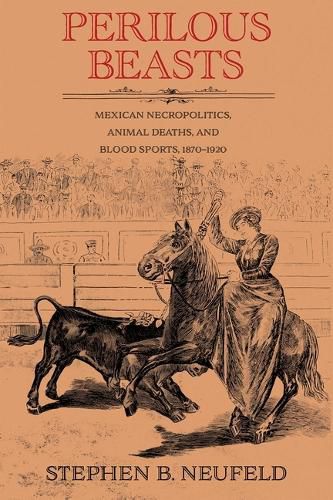Readings Newsletter
Become a Readings Member to make your shopping experience even easier.
Sign in or sign up for free!
You’re not far away from qualifying for FREE standard shipping within Australia
You’ve qualified for FREE standard shipping within Australia
The cart is loading…






A deep dive into the history of bullfighting, hunting, and animal control in late nineteenth- and early twentieth-century Mexico. In Perilous Beasts Stephen B. Neufeld explains how and why Mexicans accepted animal death as a part of daily human life. Whether with casual indifference or with roaring cheers, the death of animals became a feature of the emerging liberal and capitalist society.
This study looks at an era between 1870 and 1920 when cities became killers, sports became spectacle, and wildlife became game. Beasts died for science and entertainment all across turn-of-the-century Mexico from cities and suburbs to wildernesses, best exemplified by the proliferation of blood sports--cockfighting, bullfighting, and hunting. Neufeld explores topics including public health and the war against rabies, the emergence of the bullring as modern entertainment, and the deep contradictions between elite safari and indigenous foodways. Perilous Beasts examines how Mexicans made sense of and culture from these practices. Although some pushed back and demanded the abolition of practices like the bullfight, many supported these sports with enthusiasm and even, at times, with full-throated rioting and arson.
As animals lost their status as "fellow beings" they became casualties to the genocidal impulses of a changing society. Through considerations of how the human-animal justified killing dogs, roosters, bulls, and other creatures for reasons beyond strict necessity, Perilous Beasts explains the necropolitical ecology and power of a transformed Mexico.
$9.00 standard shipping within Australia
FREE standard shipping within Australia for orders over $100.00
Express & International shipping calculated at checkout
A deep dive into the history of bullfighting, hunting, and animal control in late nineteenth- and early twentieth-century Mexico. In Perilous Beasts Stephen B. Neufeld explains how and why Mexicans accepted animal death as a part of daily human life. Whether with casual indifference or with roaring cheers, the death of animals became a feature of the emerging liberal and capitalist society.
This study looks at an era between 1870 and 1920 when cities became killers, sports became spectacle, and wildlife became game. Beasts died for science and entertainment all across turn-of-the-century Mexico from cities and suburbs to wildernesses, best exemplified by the proliferation of blood sports--cockfighting, bullfighting, and hunting. Neufeld explores topics including public health and the war against rabies, the emergence of the bullring as modern entertainment, and the deep contradictions between elite safari and indigenous foodways. Perilous Beasts examines how Mexicans made sense of and culture from these practices. Although some pushed back and demanded the abolition of practices like the bullfight, many supported these sports with enthusiasm and even, at times, with full-throated rioting and arson.
As animals lost their status as "fellow beings" they became casualties to the genocidal impulses of a changing society. Through considerations of how the human-animal justified killing dogs, roosters, bulls, and other creatures for reasons beyond strict necessity, Perilous Beasts explains the necropolitical ecology and power of a transformed Mexico.